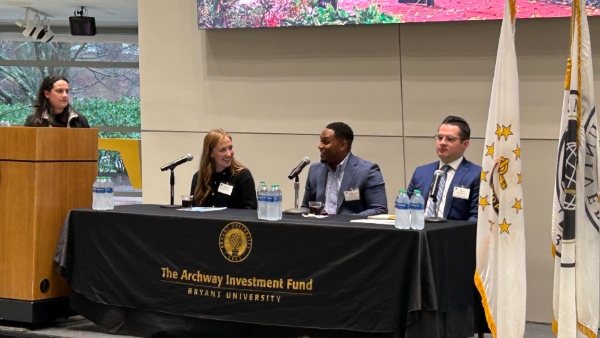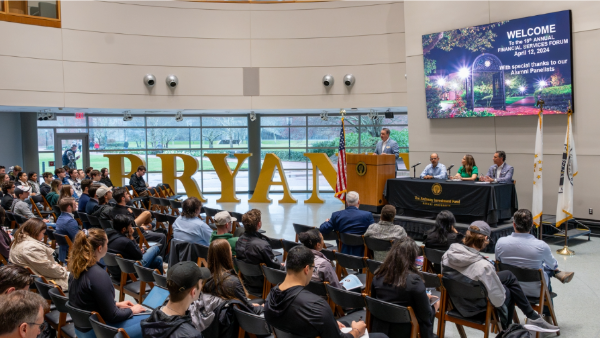Andrew Goldberg ’02, the keynote speaker for Bryant’s 18th Annual Financial Services Forum, told the crowd that he has the coolest job in the world. As SVP and head of collectible cars for Sotheby’s Financial Services, Goldberg leads a team of lending specialists who help collectors use their cars as collateral to fund investments, facilitate strategic financial planning, or to further their passion.
It's a perfect occupation, he said, for a committed car guy. "My job is to meet the biggest car collectors in the world, go see their car collections, and then lend them $50 million," Goldberg laughed. "It's perfect."
But it wasn’t always that way. “You know, I used to sit in this room and watch the alums come and speak and I was so nervous to talk to them,” he mused. “All I could think is ‘All I want to do is be you.’ "
Sitting in the audience, Kyle Forsley ’24 knows just how he felt. Forsley loves cars and he loves finance, so when he learned about what Goldberg does for a living, it was like a lightbulb switched on. “I had no idea this job existed, and now I can’t imagine anything else I’d want to do more,” he said.
The Financial Services Forum aims to trigger many more of these ah ha moments by bringing together Bryant alumni from across the financial industry, and at different stages of their careers, to share their insights on securing a place in finance, the current state of the field, and what tomorrow might bring.
“Seeing all the different paths you can go down, and seeing the breadth of the entire finance world, is extremely valuable for students,” stated Allison George ’20, an asset management strategy analyst with Fidelity Investments, who took part in a young alumni panel devoted to potential careers in finance.
Forsley, who peppered Goldberg with questions during the Q&A session of his panel, relished the opportunity to learn firsthand from the panelists’ experience. “It’s a great opportunity to see where we might go in our careers,” he noted. “It also allows us to obtain information about the jobs we might be headed to before we get there.”
Aastha Soni ’24's favorite part of the day was being able to connect with the returning alumni one-on-one, including during a luncheon where the university's student-run Archway Investment Fund delivered their spring term final presentation. “They were in our shoes not too long ago and we can see how they took their time at Bryant and used it to find success,” she said.
Here are a few key takeaways from the forum.
Finding success means staying curious
The day began with a panel devoted to finding your way in the finance industry, in which all three panelists agreed that exploration, and versatility, are the keys. “When you learn about your role models, one of the things you notice is that their career is not as straight line; it’s usually a bumpy road,” noted Michael Alfieri ’21, now a senior associate at Berkley Research Group. To prepare for that bumpy road, he suggested that students get comfortable being uncomfortable — and praised Bryant for putting him on the spot through rigorous coursework and an emphasis on presenting.
George had a similar revelation when it came to her own previous mentors. “When I started, I had the naïve thought, ‘Oh, they know everything,’ but they don't because no one does,” she shared. “But they are comfortable asking questions and digging deeper into topics — and I think that that's something that I've realized; you should never stop learning.”
That curiosity should also apply to your own career path, argued Shane Kelly ’21 ’22MBA, who is now an associate relationship manager with Santander Bank. Too often, he worried, students get so caught up in the details of trying to pre-select a job that they don’t bother to find out whether it would be a good fit for them. “Go out and talk to people, especially other alumni,” he urged. “Ask them how they got where they are, what skills they needed, and what they like about their jobs.”
Returning to the office is a good move for your career
The panelists also discussed the day-to-day of their jobs, including the value of returning to the office. “I would say, if you're given the option to be in the office, you should be in the office,” said George. “I started my first role and for about a year and a half I worked at home, and don't get me wrong, it was pretty nice, but I definitely did not learn as much as I could have, versus being in the office. Those little run-ins with the people around you, at Fidelity we call them ‘casual collisions,’ are hugely important to your career.”
In addition to seeing others, working on site gives you greater visibility, she suggested. “One thing I have learned over the years is how crucial it is to develop your own brand. You want to be that person who's an expert in XYZ, and it's easier to create that brand and that identity in the office in-person with people. When you're online, you're just a face on a screen and it’s much easier to be forgotten.”

The banking/fintech battle is over
We’re in the third stage of fintech, suggested Mario Hernandez ’97MBA, founder and CEO of Impesa, a fintech firm with a variety of products and customers in five companies, during the digital disruption in finance panel. When the fintech push started in 2015, the banks were initially very skeptical that it would ever take off. The presiding opinion was, “We don’t care about that,” he noted.
Then there was a second phase, where fintech was seen as the enemy of the banks as they could create innovative new products faster than the traditional industries. “My banking colleagues said I turned to the dark side when I went into fintech, but it’s really been an amazing adventure,” Hernandez remembered.
Now, in this third stage, he said, the fintech and banking industries are finally working together.
Embracing change can be a group project
Rapid innovation, the disruption panelists suggested, will force all of us to reexamine how we do business. “My career has followed a pretty traditional path,” noted Nico Santini ’93, chief investment officer for insurance company Co-Action Global, “but know we all have to re-educate ourselves. Digital innovations are a generational opportunity that is going to lead to generational wealth.”
If you had told her that she would one day be returning to Bryant to speak at the Financial Services Forum, Emily Cisek ’11, who graduated with a Marketing major, wouldn’t have believed you, she said. Now, as co-founder and CEO of The Postage, she runs a life-planning and SMB succession software platform that helps people plan their legacies. Going forward, combining tech-savviness with financial knowhow will be key across the industry, advised Cisek.
“Understand your strengths and understand that being underestimated is an opportunity, and surround yourself with people who can fill the gaps you have,” she told the students. If we work together, she suggested, “All boats rise.”
The world of tomorrow will have opportunities and challenges
The adoption of digital assets and currencies, the panel agreed, could be gamechangers. By removing impediments, inefficiencies, and middlemen, Santini suggested, we could radically rethink how we do business. Imagine a world, he suggests, where the U.S. could use central bank digital currencies to quickly deposit relief checks directly into special digital wallets in the wake of a disaster.
However, there would be drawbacks to that approach, the panel noted, including the government controlling how you could use those payments. Hernandez, using the example of the Argentinian corralito economic measures, decried the idea of an outside force deciding how wealth is transferred. “I don’t like the fact that someone can decide how, or when I spend my money,” he stated.

Discover an area where you’re indispensable and make it your own
In a keynote conversation with Drew Mahoney ’26, Goldberg discussed his career path and offered advice for the next generation. One of the biggest pieces, he suggested, was finding your niche. “When senior management is giving directions on how to direct the bonuses at the end of the year, their philosophy is basically this: On any team, there's always one person, or maybe two, that you cannot live without,” he explained. “What you have do is find a place in the business where you are that indispensable person.”
Sometimes that even means carving out a new space that is entirely your own, Goldberg suggested, pointing to his work establishing J.P. Morgan’s Passions and Pursuits Advisory Group, which helps clients with the financial considerations related to their personal interests. “The sky is the limit when you can create your own business card,” he told the audience.
Value changes over time, but love is love
Goldberg also discussed potential changes in the collectibles market, his area of expertise — especially as money changes hands from one generation to the next. “This wealth transition that's going to happen will be the largest wealth tsunami in the history of the planet. And there are going to be dislocations as that happens.”
He pointed to the car market as an example of an industry that might see great change. “Around 100 years ago, we all got around by horseback — everyone had a horse. But today, even if you’re rich, if you want to ride a horse you have to go to a special place to do that, like a farm with a track. Cars might end up like that 50 years from now," he speculated. "If you want to drive a car yourself, you have to go to a track while we all get around in space buggies. And, so, to me, any car today that's still got a motor, that still burns gasoline — that’s going to drive the value up as a rare collectible.”
Changing preferences with regard to what he called “passion assets” can render them volatile, Goldberg suggested. “To me, you should be buying these things because you love them, not because you're banking on them going up in value,” he suggested.